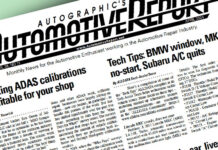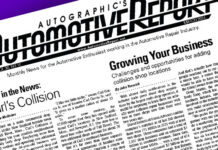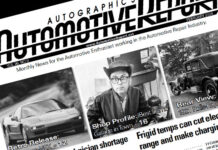From marketing, production and equipment, shop owners share what works for them
By John Yoswick
Spend a little time talking to another shop owner — whether one from across town or across the country — and you’ll likely pick up an idea or two you can implement in your business. Here are a few examples of ideas shop owners and managers have used to improve their business in some way.
Change in paint line boosts shop’s performance
Rudy Romero, director at Gosch Toyota Collision Center in Hemet, Calif., is currently focused on improving parts accuracy, purchasing additional parts carts so that all parts for any given job are on a cart, and employees can quickly compare new parts to the old to ensure, early in the process, that everything is correct.
Romero has also hired a mid-level technician who will be trained to specialize in repair of plastic bumpers.
“We’ll basically be opening a bumper shop within our facility,” Romero said. “Most collisions involve a bumper, front or rear. If I can take those bumpers off the other techs and give them to a specialty technician to repair and get them into paint, the other guys can focus on the meat and potatoes. I think we’ll see an increase in quality with another reduction in cycle time.”
In-house training helps build shop’s’ staff
Kevin Morse of Elite Collision Center in Battle Ground, Wash., says the in-house training program he now uses to ensure his staff of 15 people always includes an apprentice or mid-level technician to help meet future staffing needs.
“We created a program that shows them, ‘Here’s where you’re going to start, and here are the eight steps it takes to become a journeyman body tech, and here’s what I can guarantee you if you meet all these criteria along these eight steps,’” Morse said. “It’s enticing. A young person can look at this program and see, ‘Here’s where I start out, and here’s where I am in four years. And the shop is paying me while I’m learning.’”
Stop discounting and instead reward employees
Byron Davis said at one time his company participated in as many as a dozen insurer direct repair programs, but he has scaled that back significantly without hurting the business.
“We weeded out,” said Davis, owner of Auto Body Specialties in Oregon. “They just weren’t all mutually beneficial. It was a one-way street. And we realized you just don’t have to give the farm away. If you have a good reputation, a great client base and you’re constantly working to build that, that will drive your business.”
Fewer discounts to insurers also helps the company offer better benefits to attract and retain quality employees, Davis said. Auto Body Specialties offers its 20 employees full health care and dental coverage, life insurance policies and a retirement plan.
“When you’re so busy trying to out-cheap the other guys, you can’t take care of the people you have,” Davis said. “I can walk out there and shake their hand and look them in the eye and tell them how valuable they are. I worked in a lot of shops. Never once did that ever happen. There’s something about being valued, being part of something bigger than yourself. The grass doesn’t look greener somewhere else when you’re a valued person where you are.”
Community involvement, keeping techs happy
Jack Brito points to a number of factors that have helped his business, Hot Rod Dreamworks Collision Repair, in Canby, Ore., grow to 12 employees in recent years: taking care of customers through “honest, high-quality repairs,” online reviews, and perhaps most of all, community involvement.
For more than a decade, the shop has hosted a free annual car show in June, attracting hundreds of people by opening the shop for tours and filling its parking lot — and that of the adjacent Ford dealer — with classic and custom cars, including many the shop has restored.
“People can see the type of work we do,” Brito said of the event. “We have it catered, and donate 100 percent of the money we get in for the food” to the American Cancer Society.
For a number of years, Hot Rod Dreamworks also has donated a vehicle to a local family in need through its “Wheels to Prosper” program. The most recent recipient was a single mother of four, going to school to be better equipped to support her family.
“The cars are sometimes donated, or we come across a car that fits the criteria,” Brito said. “We fix it up, detail it. As far as finding the right family, we notify a local charity and seek nominations on Facebook. We’re looking for people who are working to get ahead, who maybe have had bad things happen. A lot of bad things happen to good people. We have non-biased people in the community — like the mayor or city council — pick a winner.”
The shop is planning an expansion, but also freed up interior space by placing two shipping containers in its lot for parts storage. Brito said that has helped kept parts clean and damage-free.
Equipping to do more in-house
It’s not all that uncommon to find a collision repair business that has reached its 25th anniversary in business. But there aren’t many that reached that milestone in 1902 and are still operating.
“I like to say we’re a modern shop that has been around forever,” said Ron Arth of George V. Arth & Son, who operates the business his great-grandfather started — as a blacksmith shop — in 1877 in Oakland, Calif.
Arth said the business clearly has evolved with the times, first shifting from carriage work to putting wagon beds onto truck chassis as motorized vehicles developed.
Decades later, he said, the shop was among the first to bring in unibody frame equipment and computerized estimating. Today, the shop is equipped and certified for Ford aluminum repair, is installing LED lighting throughout the shop to meet Honda certification requirements, and is adding a second Hunter alignment rack.
“The new alignment rack will make us more efficient and allow us to do stability control calibrations here,” Arth said. “I don’t waste time sending two employees down and back to the alignment shop. We try to do alignments before a vehicle goes to the paint shop, so if we do need to order parts, they are here. That definitely improves our turn-around time.”
New location, delegation seen as smart decisions
Gary Oliver said G.O.’s Collision in Yakima, Wash., probably wouldn’t have survived past his retirement in the not-too-distant future if he hadn’t calculated one specific number that told him it was time to move the business to a new location.
“It was $2,000 a month,” Oliver said. “That’s what I was spending just to move cars.”
For close to two decades, Oliver operated his business out of a downtown building he’d purchased. He’d added on to the building over the years, but the issue had become parking.
“I had five guys moving cars out for a half hour every morning,” Oliver said. “At night, the same thing, moving them back in. I started penciling out how much money I was spending on that, not even counting the cost in lost wages because those guys weren’t doing other work. So it was sort of a no-brainer when this opportunity came up here.”
By “here,” Oliver means the company’s new location in a former sporting goods store. Since last year, the business has repaired its monthly car count out of two large adjacent buildings located on several acres on the town’s busiest street.
“We now have room to grow if needed in the future,” Oliver said. “There would even be room here to add a tow yard or glass shop.”
The move to the new location also helped Oliver realize he can take a step back from his significant involvement in the day-to-day operations at the shop. That started as he focused on the work needed to prepare the new facility, but has continued even after the move.
“I delegated the operations to other people, who were very well qualified to take over for me, but I just hadn’t realized that,” Oliver said. “I didn’t give my people enough credit. For the last year and a half, my participation in the day-to-day business is almost nil. It runs itself now. I have a great crew that takes care of it. It was an eye-opener for me, that I was able to do that. That’s huge.”
That, he said, will help ensure the business survives long past his expected retirement in a couple of years.
Investing in towing
Kelly Whitlock said it just penciled out for A Master & Touch Body & Paint in Portland, Ore., to buy a tow truck.
“When insurance companies quit allowing us to mark up tow bills, we bought a tow truck so we can do all our own tows,” he said. “I had tried to talk my dad into getting a tow truck for years. Finally, we had enough money in the account, and I found a good deal on one, and I just went out and wrote a check for it.”
In addition to transporting vehicles to and from sublet vendors, the tow truck has helped the shop pull in business from further away, such as when a previous customer had an accident 60 miles away.
“It was a $500 tow bill for an hour-and-a-half to go do it,” Whitlock said. “That’s pretty decent. We don’t try to be exorbitant, just get paid for what we do.”
Another tool Whitlock has used to help his negotiations with insurance companies is BillableGenie, an online database of claims data searchable by insurance company and estimate line item.
“When an insurance company says, ‘We don’t pay for that,’ it’s usually not true, because they actually do,” he said. “I used this last week when an insurance company said they wouldn’t pay for pre- and post-repair scans. I pulled up the system and showed them the claim numbers users had submitted on which that insurance company did pay for those scans. She then said that was in a different part of the country, but I said they don’t fix the car any differently in Michigan than they do here.” •
John Yoswick, a freelance writer based in Portland, Ore., who has been writing about the automotive industry since 1988, is also the editor of the weekly CRASH Network (www.CrashNetwork.com). He can be contacted by email at john@CrashNetwork.com.



